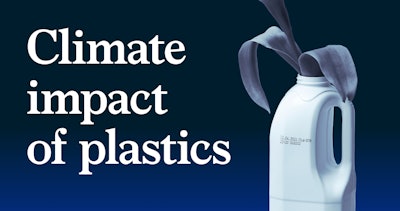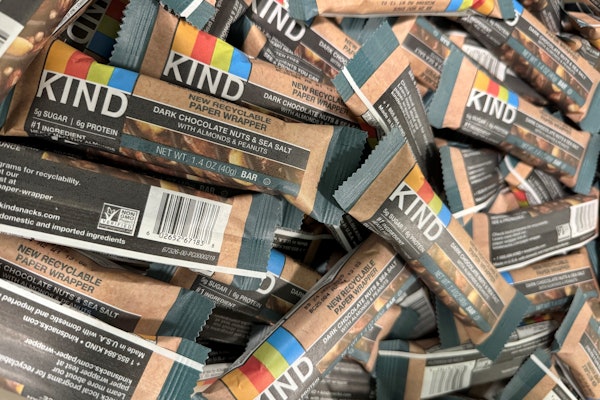Amidst the ongoing demonization of single-use plastic packaging, global consulting firm McKinsey & Co. has published a thought-provoking report on the “Climate Impacts of Plastics,” and the conclusions may surprise you. When examining the total greenhouse gas (GHG) contribution of plastics versus its alternatives, including product lifecycle (cradle to grave) and impact of use, it found that among those applications for which non-plastic alternatives are used at scale, the plastics examined in the report offer a lower total greenhouse gas GHG contribution compared with alternatives in 13 of 14 cases, including both direct and indirect value-chain emissions. These GHG savings ranged from 10% to 90%, considering both product lifecycle and impact of use.
Furthermore, the report noted, when indirect impacts were excluded, such as lower food spoilage in the case of food packaging, and only direct lifecycle emissions, including production, retail transport, and end-of-life disposition, were considered, plastics had the lowest GHG impact in nine of the 14 applications.
“Plastics are ubiquitous across the global economy and the subject of frequent debate, from their impact on marine pollution to their recyclability,” says McKinsey. “However, their role in enhancing use efficiencies, such as decreasing food spoilage and reducing greenhouse gas emissions, is often overlooked. Rather, plastics are frequently maligned across topics such as leakage to the environment, toxicity, use of resources, production emissions, and ocean pollution. Although these important considerations need to be addressed, an opportunity exists for a more balanced, science-based perspective on plastics versus alternative materials.”
The 30-page document includes information on the markets selected—packaging, building and construction, automotive, textiles, and consumer durables, which represent around 90% of plastics volume—the methodology used, and in-depth details on several of the applications studied. McKinsey’s analysis was based on the U.S. market in 2020, with additional sensitivities to illustrate the impact in other regions and how results will change as the global environment moves toward a “decarbonized world” in 2050.
Among the findings of the report related to packaging in the U.S.:
· When high-density polyethylene grocery bags are compared with the next-best alternative, paper bags, HDPE packaging is found to have 80% fewer total GHGs.
· Wet pet-food packaging in PET and polypropylene versus aluminum or steel packaging has 70% fewer emissions.
· PET soft drink containers emit 50% fewer GHGs than aluminum bottles.
· Fresh meat packaging made from expanded polystyrene or polyvinyl chloride has a 35% smaller GHG footprint compared to fresh meat packaging made from paper.
· When compared with glass soap containers, HDPE soap containers have 15% fewer GHGs.
· Industrial drums made of HDPE emit 30% more GHGs than those made from steel.
· When comparing plastics versus plastics-enabled mixed materials, McKinsey found that HDPE milk containers have 5% greater GHG emissions than paper, while the GHG emissions of EPS water cups and paper cups are on par.
One of the applications chosen for a deep-dive analysis in the report is soft drink containers. McKinsey explains that it based its analysis on a comparison of 20-oz PET bottles with 12-oz aluminum cans and 12-oz glass bottles, selected because they represent the most common beverage container sizes for their respective material substrates. According to the LCA, PET bottles have the lowest emissions of all the materials, due to their lightweight properties and the low amount of energy required to produce them. “By contrast, aluminum cans have two times the emissions of PET bottles, and emissions from glass bottles are three times higher,” shares the report.
While the PET bottle has the lowest production emissions, the lifecycle analysis found that it has the least favorable GHG emissions for its end-of-life disposition. “PET has the lowest recycling rate and credits from avoided virgin production among the three materials. It also has the highest emissions from waste-to-energy. PET releases CO2 when burned, whereas aluminum and glass do not,” explains the report. “However, the GHG impact of production emissions is more significant than end-of-life disposition emissions, resulting in PET having the lowest GHG impact.”
In its study, McKinsey also found that the indirect value-chain impacts of plastics can be quite substantial, particularly in the case of plastic used in food packaging. “There are few at-scale alternatives to plastic in food packaging across a broad range of applications, driven primarily by reduced food spoilage when using plastics,” says the report.
In evaluating 20 common food categories, McKinsey found that plastic packaging is used in more than 90% of products sold in six categories, including fresh and frozen meat, breakfast cereal, yogurt, cheese, still bottled water, and frozen food. In another eight categories—milk, edible oil, chocolate, nut and seed mixes, cookies, packaged bread, juice, and rice—plastic is present in the packaging of more than 50% of the products sold. Notes the report, “These figures translate to a significant but unquantified GHG benefit from plastics.”
Through its analysis of different product categories and applications, McKinsey successfully conveys that a multitude of factors must be weighed and balanced in order to select the most environmentally friendly material. The trick, it advises, is to know how much the positives outweigh the negatives.


























